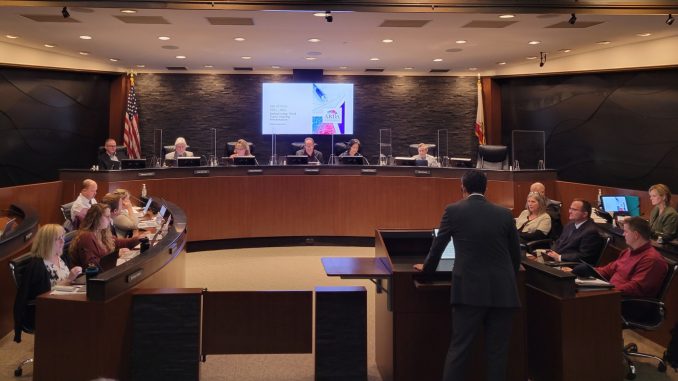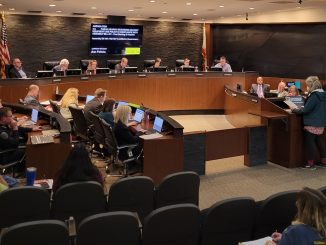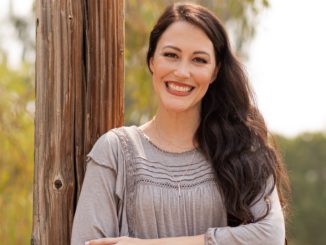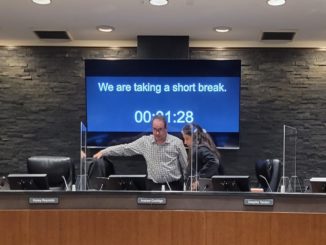
If no man—or woman—is an island, as the saying goes, Alex Brown was at least a peninsula at the Chico City Council meeting Tuesday (March 15).
The agenda happened to include an item about “islands,” unincorporated spots within city limits that Chico might annex, which the council decided to do with four areas around town. She voted with her colleagues on that, but not on an ordinance about police armament policy—and during the night’s significant deliberation, on redistricting, the panel’s lone progressive felt out on her own.
Councilman Sean Morgan, who sits to her left-hand side, decided not to return to the dais after the break preceding the redistricting discussion. Instead, he took a seat in the staff section below, next to City Manager Mark Orme. Morgan told the CN&R afterword that he moved because Brown was ill; Brown responded that she informed her colleagues by email that she had a lingering cough from a cold but was otherwise fully recovered.
Regardless of rationale, the distance proved metaphorical: Morgan favored a set of three maps that Brown vehemently opposed, prompting Brown to push for a trio that ultimately advanced in a compromise proposal. Vice Mayor Kasey Reynolds moved, with a second from Morgan, for the council to consider five maps—one to be adjusted to consolidate fire-risk areas along the east side of the city—and hold a special meeting before the next regular council meeting, April 5, to allow for more public input.
The council unanimously approved the motion, which also called for including additional submitted “communities of interest”: neighborhoods or groups with common concerns.
Speaking with the CN&R by phone Wednesday morning, Brown said the meeting had “an unspoken tension in the air that I wasn’t able to grasp until the map process, because it was clear that there were moves being made.” Of the physical move, by Morgan, she said, “the timing of it was symbolic, because this council was going to move forward two maps that should never even have been considered given their misalignment with the realities of the [California] FAIR MAPS Act and the concept of the integrity in the map-making process.
“Just because maps are legal doesn’t make them good maps, and in my opinion, the two worst maps were advocated for by Mr. Morgan, who decided to move right before that conversation took place.”
From the 12 maps presented at the meeting by demographer Claudio Gallegos, Morgan proposed going forward with the “Heart of Chico” and “Help People Vote” maps from public submissions plus the “Demographer 1” map. Brown countered with the two maps submitted since the last meeting, “Demographer 4” and “Demographer 5,” and “Goldstein 1000,” submitted by Planning Commissioner Bryce Goldstein, who in public comments expressed support for the demographer’s new maps as well. With the proviso of a special meeting, the council advanced “Demographer 4,” “Demographer 5” (which Gallegos will adjust for fire zones), “Goldstein 1000,” “Heart of Chico” and “Help People Vote.”
“In general, I am skeptical of any publicaly submitted map that doesn’t have a [person’s] name attached to it,” Brown said, “because why would you keep your submission secret unless there’s something to hide? So it just strikes me as odd that the two maps that I certainly wasn’t aware who submitted were advocated for so strongly when they did some very awkward things with communities of interest.”
Noting Gallegos’ estimate that the adjustment would shift fewer than 100 residents, Brown continued: “I can’t help but feeling something bigger than what was being said is happening, with the fact that those two maps happened to be the favorites of some of my colleagues and that I had to advocate so hard for the three maps that do the three things that the FAIR MAPS Act requires of you: keep communities of interest together, draw your lines in a way that’s clear and … keep [districts] compact.”
A council member for the city’s initial districting in 2020 (as were Brown and Reynolds), Morgan told the CN&R that “there’s no chance everyone is going to be happy” with redistricting. “It’s all give and take—and that’s when it becomes political. What I’m happy we haven’t heard is, ‘Does that [map] protect my district?’ … and that gives me joy, at the moment. Cross our fingers.”
He gave momentum to the idea of a special meeting once the vice mayor lamented the dearth of public participation—only Goldstein and Nichole Nava spoke on the issue Tuesday, during spring break week for area schools. Afterward, Morgan cited backlash over Butte County supervisorial districts as a lesson for Chico.
“I think what the council is saying is they saw what happened in the county, and … I think this group is trying to avoid that,” he said. “Let’s make sure we don’t pick a map and then everybody comes and says, ‘This is so terrible.’
“The smallest things in Chico can get 100 people in this chamber, and these maps haven’t. The demographer is [basically] saying, ‘You’ve been so transparent, people are trusting you’—but then we just had a public speaker say, ‘Nobody comes to your meetings because nobody’s interested.’ I don’t know the answer.”
Brown objected to reopening map submissions but accepted the agreed-upon scope.
“I’m not naysaying a special meeting,” she told the CN&R. “This is an important process; these are maps we’re going to be sitting with for the next 10 years. It’s very hard for me not to see the writing on the wall, given some of the conversation that happened [Tuesday night], and I’m scared about it. And the public should be, too.”
Other items
On a 7-0 vote, the council agreed to annex islands along W. Sacramento Avenue, W. East Avenue, El Monte Avenue and Chico Canyon Road. After debate surrounding administrative fees, the council also unanimously approved a small business assistance program that, in conjunction with the county, will issue $10,000 grants to approximately 180 city businesses.
Council members also found consensus on board vacancies for the Butte Choice Energy Authority, promoting community choice aggregation of electricity. Councilman Dale Bennett was appointed as the city’s second representative, joining Brown, with Reynolds and Mayor Andrew Coolidge appointed as the alternates.
Earlier, Brown pulled from the consent agenda the Chico Police Department’s Military Equipment Use Policy, drafted per Assembly Bill 481. This state law requires law enforcement agencies to get approval from their governing body to obtain or use weapons, artillery and armaments defined as military equipment. Chico Police Chief Matt Madden requested a city ordinance to accompany the departmental policy.
For Brown’s questions, Madden deferred to Chico Police Capt. Billy Aldridge, who explained that the law did not change what the department was already doing operationally; it increased transparency to the public through annual reporting and council approval. The department would have latitude to replace light arms (i.e., rifles) and ammunition without approval as allocated in its budget.
Reynolds and Bennett offered effusive praise for Chico police before casting affirmative votes. Brown dissented in the 6-1 decision, telling the CN&R: “The fact that I was the only person asking questions on it and voicing some of the concerns that we heard from folks in the comments, both written [via the Engaged Chico platform] and public, that’s just not the way you go about those types of changes.”




People only participate if they feel they are going to be listen to and their questions answered.